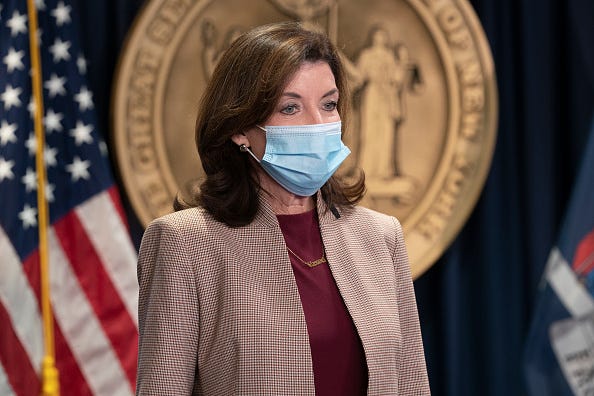
NEW YORK (1010 WINS) -- As concerns ramp up for the newest COVID-19 variant, New York officials are keeping a close eye on how the situation develops and how it could impact the state.

Gov. Kathy Hochul declared a disaster emergency Friday evening, signing an executive order that would boost hospital capacity ahead of potential spikes due to the omicron variant.
"Through this action, we will also be able to acquire critical supplies more quickly to combat the pandemic," Hochul tweeted about the declaration, which lasts through Jan. 15.
Her order also allows the state health department to limit non-essential surgeries, if needed, to ensure capacity.
A World Health Organization panel named the variant “omicron” and classified it as a highly transmissible virus of concern, the same category that includes the predominant delta variant, which is still a scourge driving higher cases of sickness and death in Europe and parts of the United States.
Hochul said Friday that there were no known cases of the new variant in the state at this point. In her executive order, she cited that New York COVID-19 transmission numbers were at "rates the State has not seen since April 2020."
“The Department of Health's Wadsworth Center Laboratory will continue to actively monitor COVID-19 virus samples selected from throughout New York State to compare sequences and identify circulating and new variants,” said Hochul in a statement. “We are not surprised that new variants are emerging and may likely end up in New York. We will continue to monitor WHO actions and work with our partners at the CDC to keep a close eye on developments."
The governor reminded New Yorkers to continue to be cautious, including masking indoors, getting tested and staying home when sick.
Mayor Bill de Blasio spokeswoman Danielle Filson told the Daily News that City Hall is “following global scientific reports closely" and will keep city residents in tune with any impacts the variant could have.
Mayor-elect Eric Adams joined Hochul in urging residents to get vaccinated, including their booster dose, if they’re eligible.
"This is a concerning development that we must watch extremely closely, and be prepared to address as a city, state and country," Adams tweeted. "Our health officials must engage directly with those tracking this potential new variant and have response options available should it prove to be significantly more virulent."
The state’s latest COVID-19 figures showed a 3.45% positivity rate, and hospitalizations up to nearly 2,600, whereas that number was below 2,000 just days ago.
CDC figures show almost 74% of all New Yorkers have gotten at least a single vaccine dose.
Omicron's actual risks are not understood. But early evidence suggests an increased risk of reinfection compared with other highly transmissible variants, the WHO said. That means people who contracted COVID-19 and recovered could be subject to catching it again. It could take weeks to know if current vaccines are less effective against it.
In response to the variant's discovery in southern Africa, the United States, Canada, Russia and a host of other countries joined the European Union in restricting travel for visitors from southern Africa, where the variant brought on a fresh surge of infections.
Medical experts, including the WHO, warned against any overreaction before the variant was better understood. But a jittery world feared the worst nearly two years after the tenacious virus emerged and triggered a pandemic that has killed more than 5 million people around the globe.
Omicron has yet to be detected in the United States, said Dr. Anthony Fauci, the U.S. government's top infectious disease expert. Although it may be more transmissible and resistant to vaccines than other variants, "we don’t know that for sure right now,” he told CNN.
The Associated Press contributed to this report.



